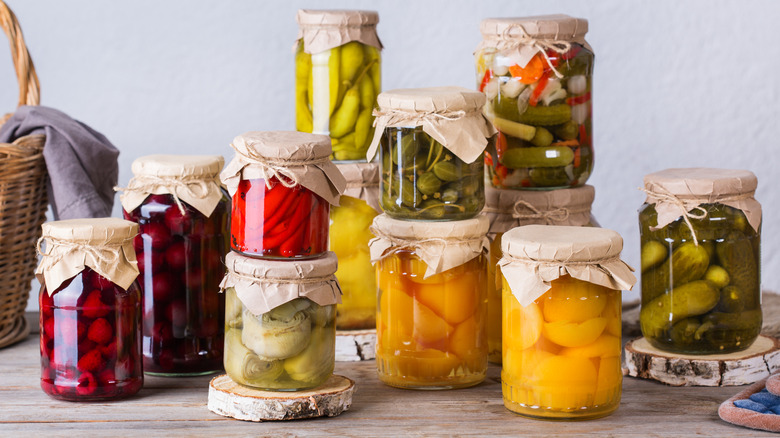The Safety Tip You Need To Remember Before Thickening Home-Canned Goods
Home canning is a fascinating hobby and a great way to extend the shelf life of veggies, soups, and meats that might otherwise have gone bad. However, home canning can be tricky, and making a mistake is easy if you don't follow proper canning techniques. Home canning doesn't offer the same room for improvisation and experimentation as traditional cooking. Not all practices in the kitchen can be used interchangeably when processing food. For instance, you may be tempted to make that bean soup or tomato sauce thicker by adding cornstarch before canning. But that would be a costly error.
Whether you are canning vegetables, meat, or soup, you should never use flour or cornstarch to thicken your mixture before canning. Including starch in your mixture can ruin your home-canned goods. It can also affect your health, as it opens up the potential for food spoilage. Likewise, you should avoid canning starchy products like pasta, rice, noodles, or barley. So, unfortunately, that means you should probably skip home-canning chicken noodle soup.
Likewise, you shouldn't home-can meat or vegetables that are coated in flour or a similar batter. Doing so will make your home goods unsafe for consumption.
Why you shouldn't use thickening agents
As mentioned above, home canning is more of a science than an art. To ensure your home goods are safe for consumption, it's important to kill any potentially harmful microbes inside the jar. Depending on the acidity of the foods, this process is done either through boiling water in a water bath for highly acidic foods, or through a pressure canner for low-acidic foods.
However, adding flour or other thickening agents can interfere with this sterilization process. The thickening agent acts as a buffer, preventing heat from reaching the center of the jar and purifying the food within. Likewise, starch items such as noodles or rice also affect the overall heating of the jars. As a result, some bacteria can remain in your food and grow over time, increasing the risk of botulism or other food poisoning. Canning creates the perfect environment for the spores that protect botulism-causing bacteria to thrive. Botulism is a potentially deadly disease where toxins attack the body's nervous system. Starch can also affect the overall quality of your canned goods by clumping in the jar.
Therefore, it's not recommended to use thickening agents in your foods before canning. However, there are scenarios where you can use thickening agents when canning goods.
How to safely thicken canned goods
You should only use a thickening agent in your home canned goods if you're following a scientifically researched recipe tested to ensure it's safe for consumption. During testing, researchers consider both the PH and the consistency of the food being prepared for canning. Researchers use high-tech equipment – which home canners likely don't have — to test the final product for safety.
Before using a recipe you find online, make sure that it's been tested and approved for safety. Do not use recipes older than 1994, as they may not hold to current industry standards, and follow the guidance set by the USDA, National Center for Home Food Preservation, or another credited institution.
Some scientifically-researched recipes call for a cornstarch called Clearjel. Not only does this ingredient work well with pie fillings, but it also works with other canned goods. Clearjel is preferred since it doesn't thicken a mixture until it starts to cool, meaning when used correctly, it won't affect the purification of your foods during the canning process. However, you shouldn't just add Clearjel or another thickening agent to your own recipe. Instead, you can always have your recipe tested for a fee. Or, if you want your home canned goods thicker, you can always add thickening agents while reheating them.


